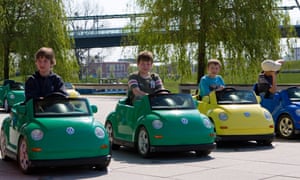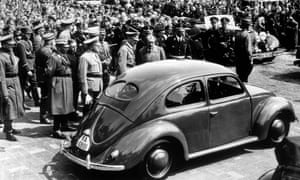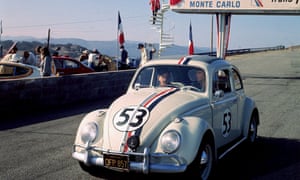From a distance, it might be a temple to the German car industry. On the edge of the small town of Wolfsburg two skyscrapers of cars tower over the land. Each glass-and-steel cylinder is almost 50 metres high and packed with 400 new Volkswagens: trim little Golfs, sleek Passat sedans and boxy people carriers.
From the top there’s a view of the vast, red-brick, 1930s-era Volkswagen factory, which turns out 2,300 cars a day. Another direction offers a glimpse of Porsche Street, Wolfsburg’s main thoroughfare, named in honour of the German car dynasty that created the VW Beetle and the eponymous sports car company. In the far distance are the autobahns where motorists are rarely troubled by speed limits.
Cars are parked in the VW towers for one or two days as they await collection. Each car is rolled out of the factory on an underground track, then propelled upwards into the tower. A car can move from factory floor to tower top in less than two minutes without a human hand touching the steering wheel. Hundreds of cars glide up and down every day, their movements controlled by computer. In 15 years of operation, VW says it has not seen so much as a single smashed wing mirror. This flawless precision technology is precisely what VW is renowned for. Now its technical mastery has tipped the German carmaker into the biggest crisis of its post-second world war history.
VW admitted last week that software that allowed cheating on emissions tests had been installed in 11 million cars. The defeat devices are likely to have caused almost one million tonnes of extra air pollution a year and may have triggered years of costly litigation. VW has set aside €6.5bn (£4.7bn) , but the scandal is likely to cost far more. US regulators, including the Environmental Protection Agency, could levy a fine of up to $18bn. At the last count, 10 countries had launched some form of investigation, while class action lawsuits are raining down.
The scandal has dominated newspaper front pages around the world for a week. The German chancellor, Angela Merkel, has demanded answers and set up a federal inquiry. The state of Lower Saxony, which owns a 20% stake in VW, has launched its own investigation amid fears that the fallout could damage the German car industry, which employs 800,000 directly with millions more jobs linked to it. One Socialist party politician, Martin Burkert, warned that the entire Made in Germany brand would be damaged, while the newspaper Die Weltspeculated that VW’s survival was at risk.
Carsten Brzeski, chief economist at the Dutch banking group ING, went a step further: “If Volkswagen’s sales were to plunge in North America in the coming months,” he warned, “this would not only have an impact on the company, but on the German economy as a whole. All of a sudden, Volkswagen has become a bigger downside risk for the German economy than the Greek debt crisis.”
The scandal has hit a raw nerve, because VW is more than just another car company. Employing more than 592,000 people around the world, it earned a record €14.8bn in profit in 2014 and earlier this year overtook its rival Toyota to become the world’s largest carmaker. But the company is more than an economic powerhouse.
In a YouGov poll last month, two-thirds of Germans named Volkswagen as the country’s number one national symbol, putting it before Merkel, the national football team, Goethe and currywurst. It would be a bit like the UK deciding that John Lewis was the essence of the nation, rating it more highly than Shakespeare, Churchill or chicken tikka masala.
The story goes back to Wolfsburg. Although the first VW prototype was built in the Nazi era on the orders of Adolf Hitler, who wanted “a people’s car”, mass production began in December 1945, as Germany emerged from the ruin of war. By then, Volkswagen was controlled by the British military government, which handed vehicle manufacturing back to Germany because no British manufacturer wanted to take on the plant. The VW car was “quite unattractive to the average buyer”, a leading British motor industry executive decided.Prof Bernhard Rieger, the author of a history of the VW Beetle, says the fact that VW is seen as a symbol of German identity explains why there is “a certain amount of hysteria” around the scandal. In his book The People’s Car, he traces how VW became the emblem of the post-second world war economic miracle: the Wirtschaftswunder. “The Federal Republic [of West Germany] for obvious reasons shied away from national symbols,” he told theObserver. “One of the very few things that emerged as a unifying symbol, along with the football team and the deutsche mark, was Volkswagen. VW retains its salience in modern Germany; otherwise you wouldn’t get this brouhaha.”
He could not have been more wrong. Within a generation the Beetle was the world’s bestselling car: in 1972 it overtook the Model T Ford as the world’s most manufactured vehicle. Although production was stopped in Germany a few years after this milestone, VW’s expansion continued despite the economic turmoil of the 1970s and early 1980s. In the 80s, 90s and early 2000s, the German company swept up Seat of Spain, the Czech brand Skoda, Britain’s Bentley limousines and a majority share in Sweden’s Scania buses and trucks.
The swagger of this era is reflected in the theme park that Volkswagen built next to its headquarters. Completed in 2000, Autostadt is Disneyland for car fans. Spread over 28 acres of clinically landscaped parkland is a vintage-car museum, driving track, restaurants, a five-star hotel and the VW car towers. The park draws more than two million visitors a year, mostly from Germany, and is a testament to the country’s enduring love of the car. In the entrance atrium a giant steel globe is suspended from the ceiling, with only one place marked – Wolfsburg.
But now Wolfsburg is worried. For decades VW cash has kept this small, unassuming town afloat: funding everything from the yellow and red flowers planted on Porsche Street to a modern art gallery and the 37,000-capacity football stadium. (To add insult to injury, Wolfsburg FC were thrashed 5-1 by rivals Bayern Munich on the day VW admitted the rogue software was installed far more widely than previously thought.)
“Everyone is frightened, at Volkswagen and in the town itself, and nobody knows where this will lead,” says Kevin Nobs, co-editor of the Wolfsburger Allgemeine. “The whole city is absolutely dependent on VW, whether we work there or not. My father works at VW, most of my friends work there. Everyone has a connection to VW and their suppliers.” It is worse, he says, than in the 1990s when a sales slowdown resulted in job losses. At that time, trade union leaders agreed to go down to a four-day week to save jobs, but nobody knows whether this would be an option if jobs are cut this time around. “Now we don’t have any options. The worker in the street doesn’t know what will happen.”
The ripples will be felt across the prosperous central German region. As several German politicians said last week, when Volkswagen sneezes, Lower Saxony catches cold. “It is a disaster,” says Matthias Groote, an SPD member of the European parliament for Lower Saxony, who says he is most worried about VW’s workforce and dependent suppliers. “[VW] has to take moral responsibility. The new managerial team has to work really hard to regain trust.”
But he does not agree with speculation that VW’s survival is at stake. Groote points out that other car companies have not been felled by scandals, citing General Motors, where faulty ignition switches have been linked to the deaths of at least 124 people. “[GM] also has to work hard to regain its reputation and to win back trust.”
But in VW’s heartland the story is only just beginning. “There will be lots of consequences, but the consequences will mostly be for Wolfsburg itself,” Kevin Nobs of the Wolfsburger Allgemeine says. “The town lives from taxes from Volkswagen and these taxes will be reduced by a great amount for years to come.”
The story of the ‘people’s car’
1970s Hollywood comes calling as Disney makes a star out of a VW called Herbie, seen above in Herbie Goes to Monte Carlo. In 1972 the Beetle overtook the Model T Ford as the world’s most manufactured vehicle.1938 Adolf Hitler inspects the ‘people’s car’. After the war British carmakers turned down the chance to run the VW plant, with one executive saying the Beetle was ‘quite unattractive to the average buyer’.
1975 The Golf sets new standards for the family hatchback, with the GTI version, above, establishing a reputation for performance that helped to turbocharge the VW name.
1978 An advert for the Bus. By now, VW camper vans had become the go-to vehicle for a family holiday or a hippy escape. Vintage vans are still in use today, lovingly restored and with a high price to boot.
1987 Volkswagen goes stylish with its ads as the marque moves upmarket with a classic campaign, right. Far right, US hip-hop band the Beastie Boys turn the VW badge into a fashion statement.
2015 Volkswagen chief executive Martin Winterkorn resigns following the emissions-rigging scandal that has dented the company’s reputation for technological excellence.

 it
it
0 comments:
Post a Comment